223 Search Results for teach me tuesday
October 18, 2017
by Carole Zangari -
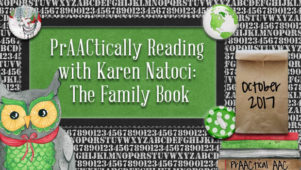
Today, we welcome back SLP Karen Natoci who is resuming her wonderful series on interactive book reading with AAC learners. Karen has supported AAC learners in different capacities throughout her career and is currently an AAC Supervisor with The Speech Pathology Group in Walnut Creek, California. You can read more about Karen at the end of her post and explore some of her previous posts here. PrAACtically Reading Book: The Family Book Written and Illustrated by Todd Parr (2003); Little, Brown and Company, Hachette Book Group AAC Competency Areas: Linguistic: Core Vocabulary Focus: big, small, same, different, like, help, my, I, Fringe Vocabulary focus: you, me, family, families, mom, dad, sister, brother (their names) Math Concept: concept of 1, more than 1, 1 versus 2, Actions: eat, noise/quiet, clean/messy Syntax: provide co-construction support, model same + one word more Strategic: Students will express a variety of communicative modalities to gain attention, and share... [Read More...]
August 30, 2017
by Carole Zangari -
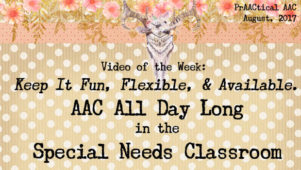
How do we make it feasible to implement AAC throughout the school day? Arizona-based SLP Anne Page, of Beautiful Speech Life, has some ideas for us. This presentation is packed full of prAACtical tips and was made possible by CoughDrop’s AAC in the Cloud Conference. Many thanks to Anne and to CoughDrop for sharing this positive approach to AAC in the classroom! Enjoy! Direct Link to Video: https://www.youtube.com/watch?v=ohvOfkyejso&list=PL8oiM_hsU8kYofdlpC4vcYX49yuBZvv9v&index=10
July 5, 2017
by Carole Zangari -
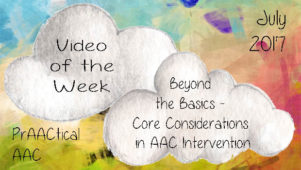
Cloudy with a (big) chance of AAC? The weather was fine at AAC in the Cloud conference, an online event hosted by the wonderful team at CoughDrop. Over two days, there were three tracks of AAC presentations and a fun keynote by Kate Ahern. Many thanks to Brian Whitmer and his colleagues for inviting me to participate. You can download the handout for the session here.
November 3, 2016
by Carole Zangari -
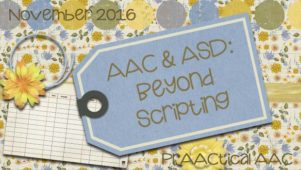
Today, we welcome Dr. Kimberly Ho, SLP and Director of Speech, Language and AAC Services at Confidence Connection in Needham, Massachusetts. In this post, she discusses how professionals in her organization are supporting AAC learners with autism on the journey toward flexible, generative language. I am the Director of Speech, Language and AAC Services at an ABA clinic, so naturally we serve many individuals with Autism Spectrum Disorder (ASD) of all ages. A vast number of learners with ASD can speak, but their speech is not functional to meet their communication needs. We have begun to provide word-based AAC systems for these students to move beyond scripting. Many individuals with ASD “script.” That is, they may not produce novel utterances, but rather chunks of phrases and sometimes entire sentences they have memorized. Sometimes this scripting is based on a character from a TV show or movie. Other times the script has been memorized in... [Read More...]
October 3, 2016
by Carole Zangari -
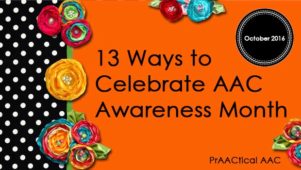
Need some ideas for celebrating AAC Awareness Month? Here are a few to get you started. Participate on the #USSAAC Twitterchat on 10/13 at 7:00 pm EDT (UTC−04:00). New to Twitterchats? You can learn more here. The wonderful Chris Bugaj will be moderating. Subscribe to a blog with an AAC content, such as Uncommon Sense, Jane Farrall Consulting, AAC Girls, or Superpower Speech Follow a new AAC topical Pinterest board from Lauren Enders and others: AAC and AT, AT/AAC/Adapt/Modify/Accessibility/Accommodations, AT for Communication, SLP AAC, & AugComm, AAC by Constantly Speaking, Communication-AAC Print, hang, or give someone an AAC awareness image, 10 Commandments of AAC Devices, or 5 Tips for Communicating with Nonverbal Student Register for a free AAC professional development webinar from Ablenet University Print out an AAC Poster, like Lauren Enders’ AAC Boot Camp-Getting AAC Users to Communicate or Kate Ahern’s The Periodic Table of AAC, Explore an AAC app or SGD that is new to you Print out song visual... [Read More...]
November 29, 2015
by Carole Zangari -
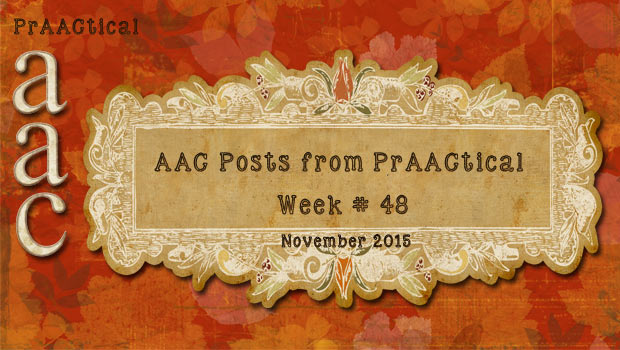
Monday – Building AAC Intervention Skills: Skillful Use of Time Delay Tuesday – How We Do It: Co-Teaching with PODD by Dana Brown and Sara Olsen Wednesday – Classroom Support for the Beginning Communicator Thursday – Happy Thanksgiving!
September 21, 2015
by Carole Zangari -
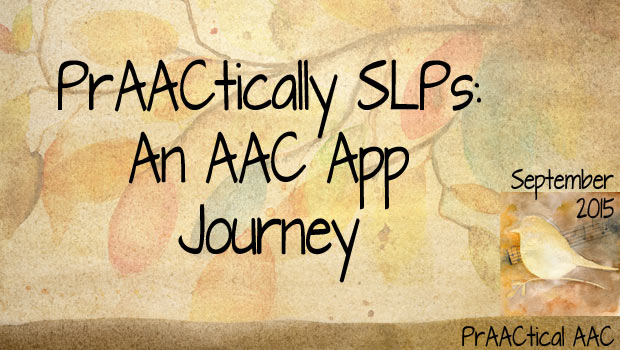
What is more amazing than seeing kids with AAC needs become competent communicators? How about seeing the next generation of SLPs become competent in AAC?! It is over-the-moon exciting to think of how many lives we could touch if more SLP students became passionate about AAC. Today, we add to our series called PrAACtically SLPs, where we hand the reins to students studying to be SLPs who’ve taken a special interest in AAC. This post is authored by Stephanie Johnson and her colleague Brianna Simmons, two Australian student Speech Pathologists from Macquarie University. They recently completed a clinical placement at Lifestart, an agency that supports children and young people living with disability. Because many of the children on their caseloads had significant communication challenges, AAC options became an important focus of their intervention. In this post, they tell us about their journey learning to use an AAC app with some of their clients. Please... [Read More...]
July 19, 2015
by Carole Zangari -
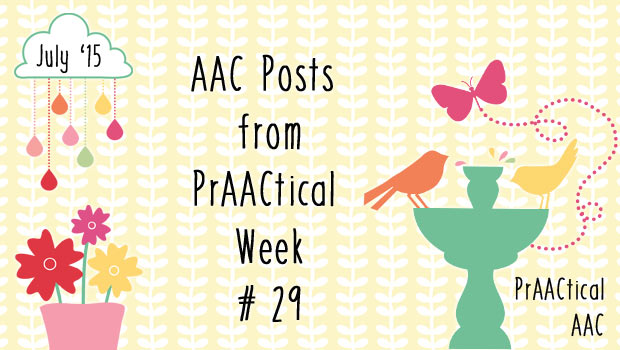
It’s been a fine week for AAC! Monday – Beyond the Core: A Guide to Teaching New Words for Students Who Use AAC Tuesday – PrAACtical Resources: Activities and Materials to Download or Explore Wednesday – Video of the Week: Narrative Skills in Students with ASD Thursday – Remembering Robin: AAC and Autism Spectrum Disorders Hope you had some AAC fun, too!
June 26, 2014
by Carole Zangari -
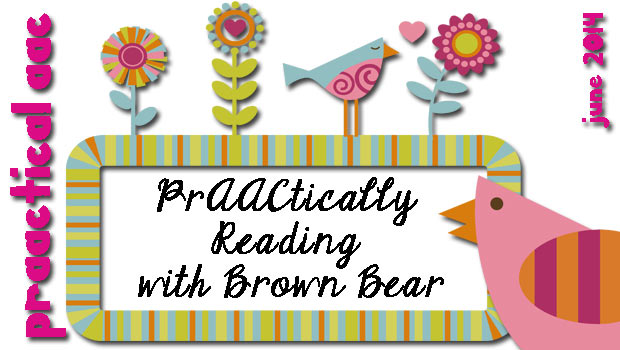
There are so many wonderful things about reading with kids, and practicing AAC is one of them. Every month, we’ll try to pick a book and provide some prAACtical suggestions for how to read it and sneak in some opportunities for receptive and expressive AAC use. You can make book-specific screens, overlays, or boards, but we favor a more powerful approach: use core vocabulary as your base and supplement with words specific to that book. Need some core language displays? There are many floating around, but here’s a link to ours if you need some more. We thought we’d start off this series with a book that is familiar to most, if not all, of you. Pull it off your shelf, find your prAACtical pal, grab that core language board, get to a cozy spot, and let’s get started. PrAACtically Reading with Brown Bear Brown Bear, Brown Bear, What Do... [Read More...]
May 17, 2014
by Carole Zangari -
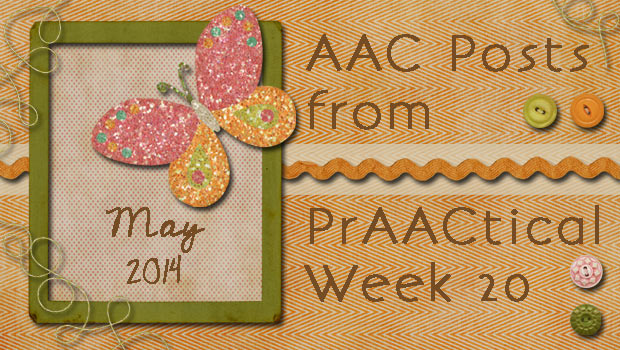
Sunday – Video of the Week: Disaster Preparedness and AAC Monday – Strategy of the Month: Home Programming with AAC Tuesday – More Core Words Visualized Wednesday – 10 AAC Things to Do For Better Hearing and Speech Month Thursday – Throwback Thursday: Posts on Core Vocabulary Friday – Connecting by Phone









